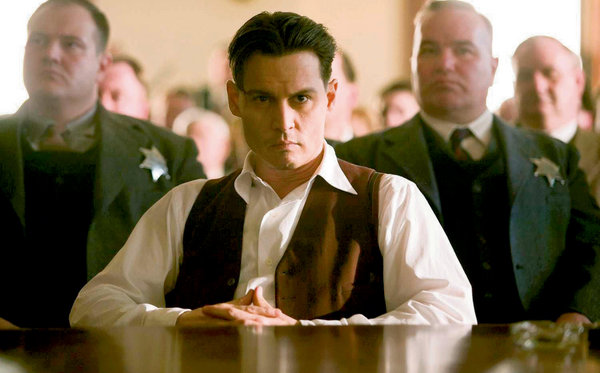
Public Enemies is an oddly soft, slow, elegiac film, which isn’t necessarily a bad thing. Some of my best friends are elegiac films. But it seems a regrettable approach to its main subject, John Dillinger, if you know anything at all about Dillinger. Such a sharp, lively renegade, I mean, and here he is on film all melancholy and tragic.
If you’ve seen one of Dillinger’s mugshots, you’ve got to be very resolute about forgetting it while watching Johnny Depp play the role. Depp’s a good actor, but even acting with all his might, there’s no way he can approximate a fraction of the wily toughness Dillinger projects in every faded old photo of him.
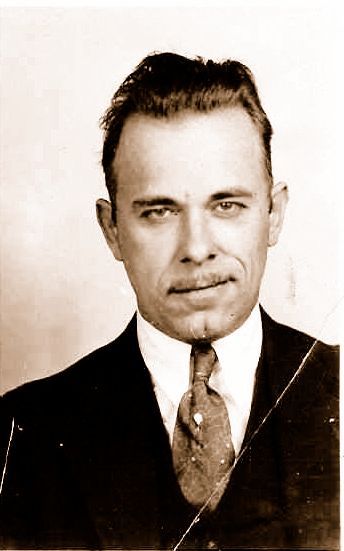
Wisely, Depp doesn’t really try. He goes, instead, for quiet self-assurance plus a relish for playing the mock-heroic outlaw role the ‘30s public loved. Plus, that John Dillinger-inspired haircut really helps: almost convict-short on the sides and back, longish on top. Beautiful haircut, that. Beats me why men ever stopped getting that haircut.
The film’s preview really emphasizes Dillinger and gang living large, busting out of prisons, knocking over hick town banks, laughing off outgunned and outwitted cops, peeling out with the loot to blow it at nightclubs and racetracks. All of which seems like a real treat—who doesn’t want to watch that?
But that’s not really the movie made by director Michael Mann and company. Instead, it’s Doomed Dillinger in Love. The high life is only established in order to make it all the more sad that Dillinger is doomed, his gang is doomed, his romance is doomed, a whole masculine order of bravery and gallantry and authenticity is doomed, doomed, doomed.
Come to think of it, Michael Mann keeps making that film, sometimes quite beautifully, sometimes not so much. It’s The Last of the Mohicans, one way or another, over and over again.
So no surprises, if you think of it that way.
Just to keep the story straight, I always go to Michael Mann films hoping he’ll do something as great as Manhunter. Sometimes he gets near it, usually in sequences here or there rather than in whole films. But I hate to say I’m beginning to think Mann is permanently dragged down by his Tragic Male obsession. He sees Tragic Males coming out of the woodwork everywhere he looks.
The nadir may be The Insider, so brilliantly shot and edited that everybody still thinks it’s a tragedy on a grand operatic scale. Except it’s really a so-so drama about a pudgy corporate exec who turns whistleblower and gets a divorce. That’s it. Nobody dies, nobody even gets knee-capped. There’s a gorgeous, lugubrious build-up to a tragic end that never happens, but is treated as if it did happen: oh my God, this poor man, this martyr, it’s unbearable…his wife left him. And she’s a total harpy, too, a classic Mann-film harpy. The whole film’s inflated with a grandiose sense of awfulness attached to mere domestic and career dust-ups. My favorite example: there’s a big suspense scene in the middle of the movie when e-mailed death threats are followed by the sounds of an apparent home break-in by corporate-hired thugs…only it turns out to be raccoons getting into the garage or something.
Anyway, Mann helped write the Public Enemies script with Ronan Bennett and Anne Biderman, based on Bryan Burrough’s book Public Enemies: America’s Greatest Crime Wave and the Birth of the FBI, 1933–34, and he’s thoroughly Manned-up the material. He’s focusing on the Dillinger manhunt by J. Edgar Hoover’s newly-constituted FBI, a team of G-men led by Melvin Purvis (Christian Bale). In Heat-like fashion, Purvis has more in common with Dillinger than with his fellow lawmen. Purvis’ instinctive sense of decency is hamstrung by Hoover’s ruthlessness and grandstanding, and he’s pushed into “taking off the white gloves,” torturing Dillinger allies for information.
So Purvis is also a Tragic Male who, the postscript assures us, came to a sad end in this rotten world.
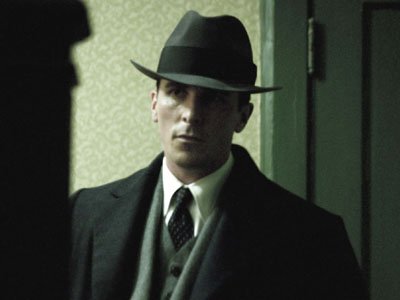
As Purvis, Bale is getting some scathing reviews for turning in yet another dull, mechanical performance. But I actually liked him in this. Get the burden of the charismatic starring role off his shoulders and he settles into his natural place, the effective second-lead. Plus that dull, mechanical quality is perfect for playing a G-man. Uptight, buttoned-up, and humorless seems to be the essence of the G-man, at least as he was generally played in movies and TV.
Billy Crudup is great but almost unrecognizable as the vile toad Hoover, and he’s really nailed the kind of radio-announcer voice common in the ‘30s that seems impossibly fictional now. He also seems to have doubled his neck size for the role, a neat trick.
Other well-known actors seem to crop up everywhere in small roles without making a big impression. Look, there’s Stephen Dorff! It’s Leelee Sobieski!…Lili Taylor!…Channing Tatum!…Giovanni Ribisi!
Marion Cotillard (Oscar winner for La Vie en Rose) is pretty and wistful as Dillinger’s girlfriend Billie Frechette, and her photo provides Dillinger something to gaze at mournfully when he’s not shooting it out with the cops.
One such shoot-out is a re-creation of the gang’s escape from the woodsy Little Bohemia Lodge in Wisconsin. The sequence is notable for showing us what high definition digital shooting can do for night scenes, because you feel like you can see every pine needle in the forest. The tommy gun bursts and flying chips of wood are lovely, but there’s no thrill here at another miraculous escape from the law. It’s a messy sequence, but presumably it’s supposed to be: the G-men fumble their opportunity again, and they’re pitted against Dillinger’s sadly depleted gang bedeviled by the participation of crackpot Babyface Nelson.
So, bummer. Of course there’s no point redirecting a film in your head the whole time you’re watching it, but during the really morose segments it was hard not to imagine the same basic material crackling with energy and glee.
Because Dillinger was one of those lucky chosen few who experience a streak of almost supernatural ease in their world. After a rocky start in life, he found his calling as a bank robber and for a while there glided along from one incredible escapade to another as if the laws of physics had been suspended for him. (The great Michael Collins of the IRA had an even more amazing streak of magical living, when he seemed untouchable, as if he could pull off any escape, break anyone out of jail, strike any target with uncanny precision, and ride his bicycle around right under the noses of his enemies, undetected.)
The early scenes of the Mann film give us some sense of Dillinger’s elan, as he and his gang move from jailbreak to bank robbery to nightclub in a stream of lovely semi-incoherent imagery. But it’s all pretty somber, highlighting efficiency and hyper-professionalism on the job. There’s none of the legendary larkiness Dillinger often brought to crime. He and his gang would set up scores by pretending to be location scouts interested in filming a bank robbery, getting the confused cooperation of bank officials and onlookers in the “staged” holdup. He once broke out of a prison armed only with a wooden “gun” he carved and painted black, and he stole the sheriff’s car for his getaway. Mann includes the sheriff’s car theft, but again, even these lively details get muted by Mann, who emphasizes the slow-driving anxiety of getting the sheriff’s car past the guards at the gate.
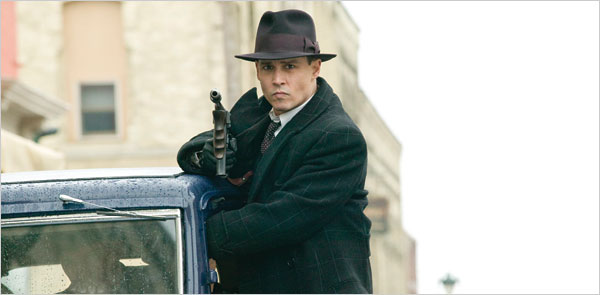
A scene late in the movie features Dillinger casually strolling into the Chicago police station and the almost-deserted official headquarters of the Dillinger manhunt. Mann doesn’t put the accent on the sheer, exhilarating nerve of this, or the perverse humor. Instead, he makes it a slow, thoughtful scene with Dillinger wandering around looking at his own life story plastered on the walls in newsprint, with pictures of his girlfriend, and mug shots of his gang all poignantly marked “DECEASED.” He then arrives at one of his own photos and stands studying it. Though the scene ends with a quiet joke, the overall effect is again, soft, meditative, somber.
I can’t even begin to say how annoying this is. Beautifully shot, though.
In the end Mann recreates Dillinger’s famous death outside the Biograph Theater after watching a Clark Gable gangster film, Manhattan Melodrama. It’s pretty awkward showing footage from an actual ‘30s film in a “period” film set in the ‘30s, because if you’re not very careful you call attention to all your “period” inauthenticity. Public Enemies seems to get all the ‘30s detail right, yet Johnny Depp never looked more totally 2009 than right after extended shots of Clark Gable saying the prophetic line as he’s about to walk the last mile: “You’ve got to die how you lived—all of a sudden.”
I won’t tell you what Dillinger’s sad last words are in this film. They aren’t “I am the last of the Mohicans,” but they might as well be.
Read more: Christian Bale, gangster movies, John Dillinger, Johnny Depp, Michael Mann, Public Enemies, Eileen Jones, movies


Got something to say to us? Then send us a letter.
Want us to stick around? Donate to The eXiled.
Twitter twerps can follow us at twitter.com/exiledonline





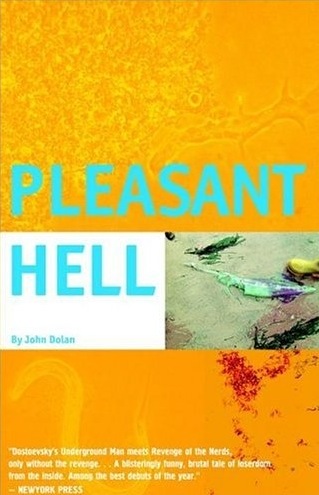









14 Comments
Add your own1. 16 Shells from a 30.06 | July 7th, 2009 at 10:16 pm
In real life, his last words were said to be:
“You got me!”
Dunno if the movie followed suit or not…
2. Crudup | July 8th, 2009 at 7:03 am
Mysterious luck riding a bike and not falling, yes. How about hitting a skyscaper with a Boeing then establishing a TV channel and groupie girls courting, pot smoking house in the cave. Then getting hanged on TV. And THEN winning USA presidential election.
3. chrisv | July 8th, 2009 at 9:56 am
That was a decent review. Personally I liked the movie, but you are totally right that Dillinger does not seem to be having any fun in that movie. Anyways, I guess it helped that I did not know much about him before hand.
My main complaint about the movie is that the men (both robbers and G-men) seemed to look identical in their accurate 30’s outfits so it was sometimes hard to tell who was who (especially in the escape from the lodge scene).
I have one advice for you Eileen, or should I say John. Stop mentioning the IRA in every freaking article. It just proves that you are John Dolan. For example, after Gary Bretcher wrote a nice English bashing article, I was finally absolutely convinced that he is John Dolan (I harbored some doubts before).
I have read the Exile for almost 10 years now and have also read some of John’s books, so I am very well acquainted with the pure hatred Dolan has for the english and his love for Irish freedom fighters. Now its not that I disagree with you John. But if you are going to create a fictitious personality, try to follow through so that those personalities are more believable. It is hard to believe that all three of John Dolan, Gary Bretcher and Eileen Jones all have the same identical love for Irish revolutionaries and hatred for the British.
So yeah, it was really cool to think that there might be a hot girl somewhere that has that great Exile writing style, but you totally ruined it for me John.
4. FSB Agent 008 | July 8th, 2009 at 10:51 am
Depp as Dillinger must be a total joke to begin with. Depp – like DiCaprio – is an eternal boy, while Dillinger is a man’s man. Dillinger looks old in his 20s, Depp looks young in his 40s. It’s a total mismatch. Depp should be playing artists, queers, whatever, just not the bank robbers of Al Capone era.
5. nikhil | July 8th, 2009 at 11:10 am
Crudup who the fuck are you talking about? Like an amalgamation of all the famous brown people in the last 10 years?
6. Allen | July 8th, 2009 at 10:50 pm
chrisv …
You do realize Jones and Bretcher have both done radio interviews and appear to be separate people? (Granted Bercher could be an exile impostor doing a bad Frenso accent, haha).
I mean they could have faked them somehow … but that does seem like a long walk to be taking.
7. John | July 9th, 2009 at 1:21 am
I don’t know; after years of reading Dolan’s stuff, I have an irrational, out-of-the-blue hatred for the English and a love of Irish freedom fighters. Maybe Dolan has a reason, but I don’t. I’m just a fan and I find myself co-opting his opinions based simply on the entertainment value of his prose (that and, as he mentioned in a lecture on the war nerd, Dolan’s writing demands to be taken as intuitively correct). It could be that Jones is just a fan.
8. John | July 9th, 2009 at 1:26 am
On the other hand, this is a classic Dolan-esque line: “Beautiful haircut, that. Beats me why men ever stopped getting that haircut.”
On the other hand, Jones’ punctuation isn’t quite as odd as Dolan’s. Dolan, especially in Pleasant Hell, but also in his articles, constantly uses periods and sentence fragments rather than utilizing semi-colons, colons, and conjunctions. Lots of fragments in lieu of complex sentences in Dolan’s writing. Not that I’m complaining, as it’s still great.
9. Mark | July 9th, 2009 at 4:27 am
I thought the movie was interesting in the way it was shot, but essentially boring overall. Depp was good, but Christian Bale’s character was lifeless. I don’t blame Bale, except for taking the job in the first place, but anybody could’ve played his role. He doesn’t need to play second fiddle, and Bale is much better in roles where he doesn’t even have to try to impersonate anyone: Harsh Times is his best film. Rescue Dawn is not that far behind.
10. Nestor | July 9th, 2009 at 4:46 am
Anyone really give a damn about the real identity of whoever writes what? It’s all just words on a screen as far as I’m concerned.
11. blowback | July 9th, 2009 at 6:09 am
Looking at that picture of John Dillinger, it struck me that Russell Crowe would be almost perfect in the role.
http://handson.provocateuse.com/images/photos/russell_crowe_07.jpg
12. FOARP | July 26th, 2009 at 2:23 am
@Blowback – Only he already had a depression era flop with Cinderella Man. Lightning doesn’t strike twice.
The whole Michael Collins bit is pure Dolan, but from the way it’s just shoe-horned in there it looks like an edit.
13. FOARP | July 26th, 2009 at 2:25 am
Plus – Eileen managed to get through an entire Harry Potter review without breaking out in a chorus of “The Guns of the IRA”, so I guess she just can’t be Dolan.
14. K. Signal Eingang | July 27th, 2009 at 7:52 am
Hey, I still get that haircut. It’s a great haircut.
Also people with fauxhawks need to be set on fucking fire. Just in case you didn’t know.
Leave a Comment
(Open to all. Comments can and will be censored at whim and without warning.)
Subscribe to the comments via RSS Feed